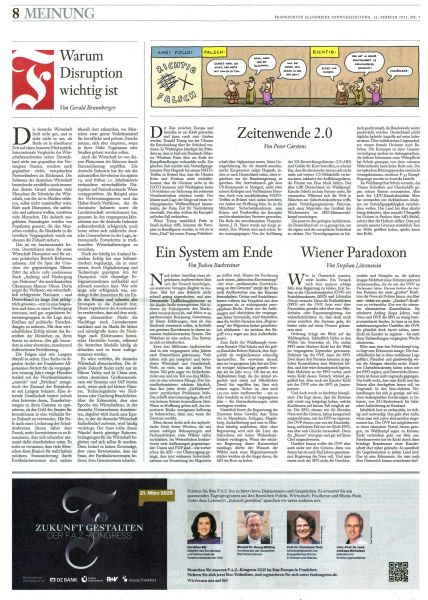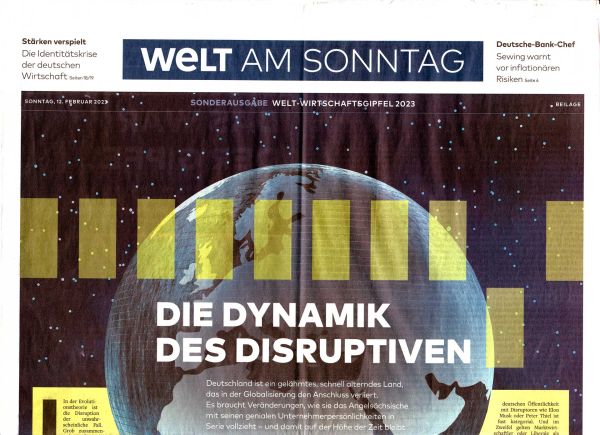Disruptions to the Status Quo
Disruptions to the Status Quo
I saw this page in the Sunday-edition of the Frankfurter Allgemeine newspaper on February 16th. It caught my attention because all the articles concern issues of pressing interest to Americans and Germans, both. Most Americans do not realize how much the two modern-day nations have in common, nor how badly they need to cooperate on world issues.
Here are the four articles and a brief description of their topics:
1, "Warum Disruption wichtig ist"—When economic and administrative problems reach a level of difficulty, only disruptive solutions will push innovation forward.
2. "Zeitenwende 2.0"—means "Historical Turning-Point version 2.0". The article deals with Trump's decision to withdraw from the Ukraine and distance itself from the NATO-treaty countries.
3. "Wiener Paradoxon"—means "The Political paradox in Vienna. Austria's political parties have struggled to find common-ground to enable them to create a stable new government.
4. "Ein System am Ende"—The system for grading asylum-seekers will have to change, due to the large number of violent crimes committed by asylum-seekers.
I decided to concentrate on only the "Disruption" article as the most topical, since it follows the decision of President Trump to overhaul, streamline, or eliminate entire departments of the Federal Government. The Frankfurter Allgemeine article follows an article in the German newspaper Die Welt, from 2023—before the Trump victory—which also uses the word "Disruption".
Clearly, American voters responded to Trump's pronouncements about the need for an overhaul of the functions of the government. Trump takes the same approach as the late financial-advisor Peter Drucker who published an article in the April 29, 1985, issue of Industry Week. Drucker wrote:
To be able to innovate, the enterprise needs to put . . . every single product, process, technology . . . and internal staff activity on trial for its life.
The Democrats, on the other hand, hate how Trump's emphasis on innovation puts them in the position as the status-quo party. Rather than simply opposing the Republican revolutionaries with a defense of the status quo, the Democrats need to publicize their own program of innovation. Otherwise, the only challenge to the status quo will come from the Facebook bloggers, who have little sense of real innovation and reform, except to guillotine the billionaires and to dish out payback to the rest of the wealthy elite.
More than anything else, the Frankfurter Allgemeine's "Disruption" article makes the point that a nation's economy has an ever-changing dynamic—moving parts that require updating and overhaul. Germany has made a mistake by depending so much on "ehemalige Erfolgsunternehmen", historically successful corpoartion, without noticing that the passing time has made them "unflexibel und schwach", weak and inflexible.
In addition, "organisierte Interressengrupppen", public-interest groups, and the "Einfluß der politischen Entscheidungen", the political mandate of the voters, wield more influence that then essentials of running a business. The article refers to the result as the "Phänomen der Sklerose durch Statussicherung", which means that the political mandates prioritize the securing of status quo over the need to innovate, adapt, and invest.
Identifying with the status quo does not go without risks, however, and some perceptive Democrts already see troubling parallels with with pre-Nazi Germany. Like Germany, modern-day America goes forward, beset by political divisions, like a mouse fought over by two hungry cats, making many Americans paranoid and pessimistic about the future. The Americans who voted for Trump basically told him "Get us outa here!!!"
They should read the late William Sheridan Allen's brilliantly researched book The Nazi Seizure of Power., published in 1984 When they read it, they will realize that the only difference between pre-Nazi Germany and modern-day America is America's stronger economy. If the American economy crashes, all bets are off:
Point One: The German Socialist Party (SPD) controlled politics in much of pre-War Germany. It drew its strength from labor unions and German Rail employees. While it ran things, the SPD, it did not bother to establish friendly relations with the other parties. When average, bourgeois Germans saw Socialists approaching them, Professor Allen wrote, they crossed to the other side of the street.
Point Two: The average, bourgeois German saw the SPD as the "Marxist" party, more-so than even the Communist Party, the KPD. Socialist Party meetings always started with a singing of the "Internationale", the Marxist anthem of the time, as well as the Soviet anthem.
Point Three: As the status-quo party, the SPD had to hold the bag for problems that arose after World War I, and had to accept responsibility for the economic hardships, even if no one could legitimately blame the Socialists for the War itself, nor for the ineptitude of the defunct monarchical administration.



